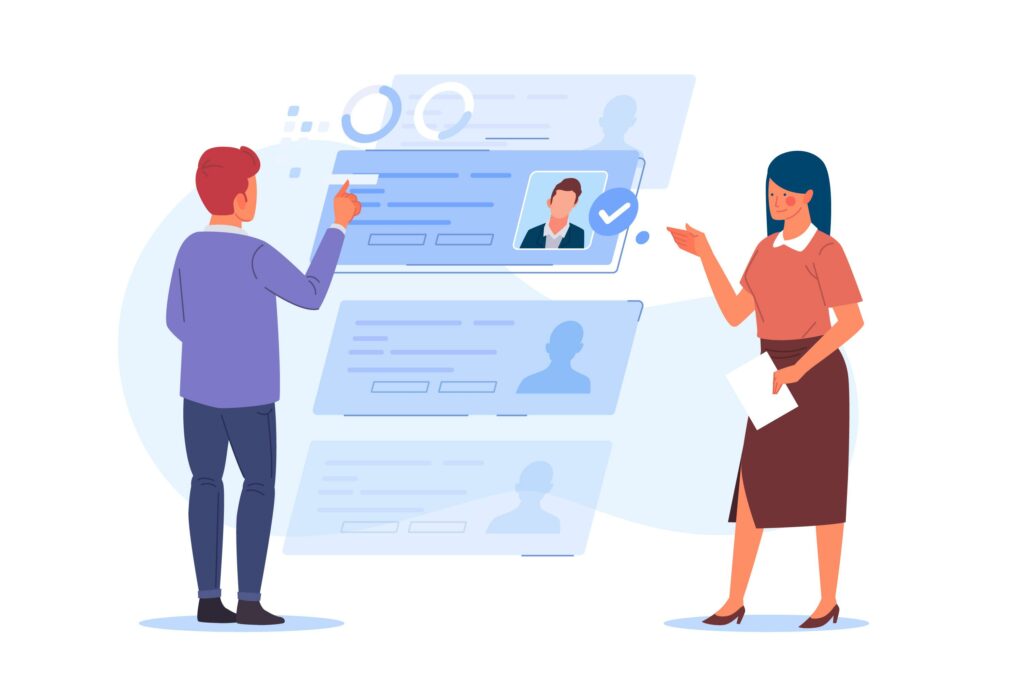The CVthèque is one of the indispensable tools of the modern recruiter, a collection of CVs that they can use to help them in their recruitment process, to find candidates who match the job requirements more easily. The tool eliminates many manual steps, saving time and effort in the search for new employees.
Would you like to know all about CV libraries and how to use them to your advantage? Intuition Software explains all about this software:

What is a CV library? Definition
A CV library (or candidate pool) is a collection of online CVs or profiles that recruiters can browse to find qualified candidates for vacancies quickly and easily. It contains detailed information on each candidate, such as qualifications, experience and other relevant data.
A CV library is thus a a very practical tool for recruiters, allowing them to dip into their bank of CVs to find the ideal profile for the position or responsibilities required. It can also be used to post job offers directly on the site for more targeted recruitment.
What are the advantages of a CV library?
CV libraries are designed to save recruiters time, so they don’t have to examine hundreds of unqualified applications. With a CV library, it will be much easier to locate, filter or even comparing different candidates, making the hiring process faster and more efficient.
By setting up this up-to-date CV database, recruiters will be able to :
- Locate the best candidates quickly and accurately,
- Targeting passive candidates,
- Filter and compare the data for each candidate,
- Make the hiring process faster and more efficient,
- Improve the candidate experience,
- Reduce recruitment costs.
Locate the best candidates quickly and accurately
When you add up all the CVs you receive (unsolicited applications) or have acquired (via social networks, for example), you can end up with hundreds of different CVs that are neither sorted nor classified.
To help you get organised, and save you from sourcing and review hundreds of unqualified applications, digital CV libraries are ideal, allowing quick access to all candidate profiles and information.
Targeting passive candidates
According to LinkedIn, 70% of the global workforce are passive profiles, i.e. people who already have a job or who are not actively looking for one. Yet many employees would be prepared to take the plunge and be dismissed for a more interesting position.
Thanks to a CV library, you can easily reach candidates without going through a headhunter, if they have already applied for a job with you, or if you have retained their CV in your database at some point (after spotting their profile on social networks, for example).
Filter and compare data for each candidate
As well as being a storage place, a CV library is a true search engine. With this tool, via cross-searches, semantic searches or via resume parsing, you’ll be able to extract profiles that match the positions you’re looking to fill in just a few clicks.
By using our Jobaffinity recruitment software, you ensure that only relevant CVs are displayed in your database, by defining your filters: skills, location, level of education, distance from the workplace, results of recruitment questionnaires, etc.
Make the hiring process faster and more efficient
A well-designed and structured CV library gives you rapid access to the best candidates for a given position. You can determine in just a few clicks: whether you need to publish a job offer, make multibroadcast on several jobboards or if using the range of profiles available in your CV library is enough.
This way, you can organise interviews more easily, without going through a job advertisement (and therefore avoiding the risk of irrelevant applications), thus reducing the length of the hiring process, as well as abandonment rate.
Improving the candidate experience
CV libraries also offer advantages for candidates, enabling them to position themselves in jobs that match their skills and receive offers that are relevant to their profiles. Candidates can also be recontacted by different companies without having to go through multiple application processes.
Reduce recruitment costs
By having a good stock of talented professionals in your CV library, it will be easier and cheaper to fill positions quickly with less action than a complete recruitment process.

Create a CV library easily with Jobaffinity
To create your own CV library quickly and easily, use our Jobaffinity software. Our recruitment software enables you to manage the entire recruitment process efficiently. From creating vacancies and publishing them on job boards, to monitoring candidates, rating them and working with recruiters or human resources professionals.
Here you can create candidate pools in just a few clicks, assign profiles from different sources (job platforms, LinkedIn, unsolicited applications, etc) and Access the best candidates for a given position.
To create your CV library with Jobaffinity, just create a category and rename it by job type, department or location. Once you have created the category, all you have to do is add the profiles that interest you to it, by clicking on “add to pool” on the chosen profile.
You can then filter and search by keyword to find a profile, view their CV, send them a message or arrange a meeting. With our intuitive interface, you’ll save time and money by building up an efficient, well-organised CV library. Request a demo!

How can we ensure that the storage of CVs complies with the law?
By using reliable CV software, such as our ATS from Jobaffinity, you can be assured that all data stored in your CV database will be kept secure and private, in compliance with the RGPD. Each user will only be able to access the data they need to do their job, so your CV database is secure and compliant with the law.
You’ll also have the option of restarting the data retention request once the legal deadline has passed, in just a few clicks.
With Jobaffinity, creating a CV database is a simple and effective way of building up your own library of potential candidates. Our software will help you save time and money in the recruitment process and also guarantees that all data stored is secure and compliant with RGPD regulations.
Ask our team for a demonstration, and you’ll see how, thanks to an intuitive interface, creating candidate pools has never been easier.
Interested? Request a demo!








